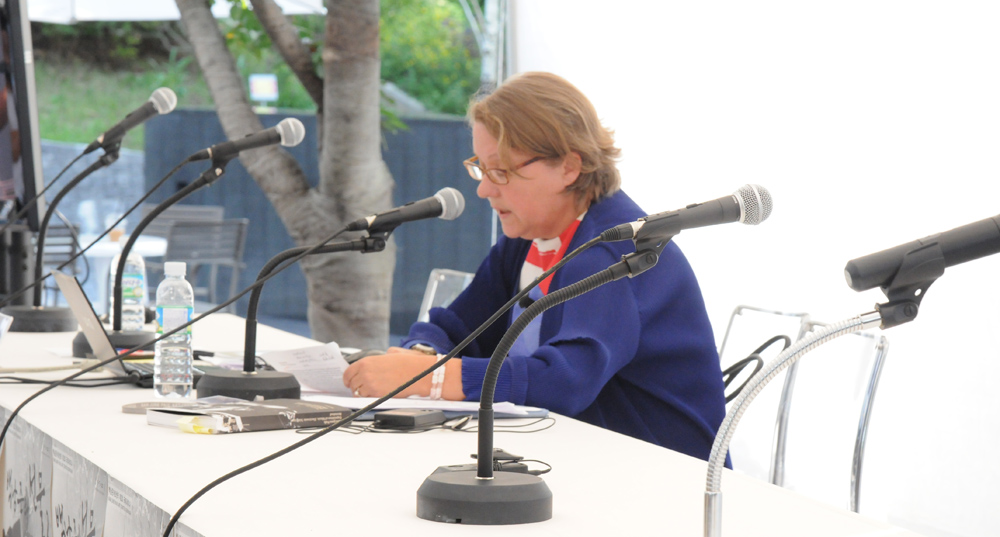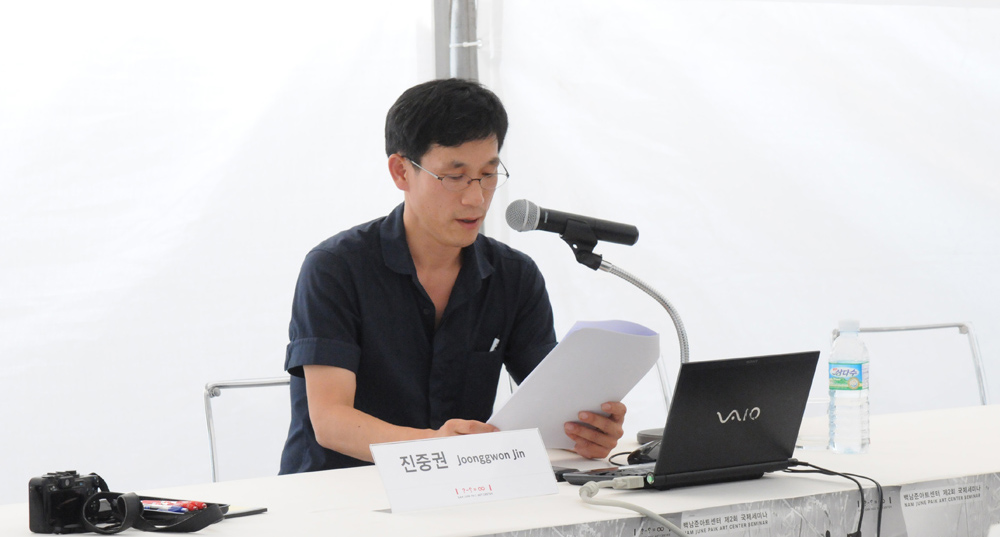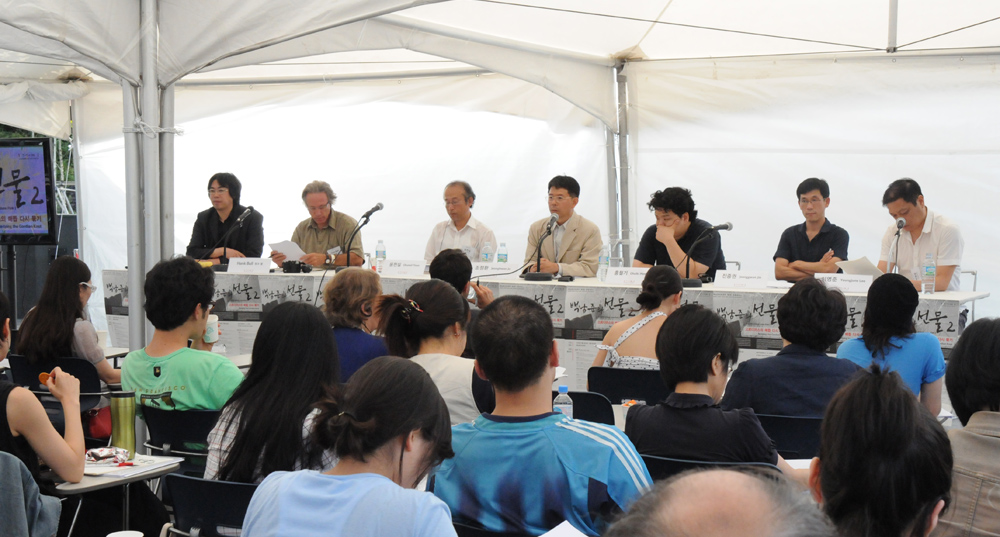The departure point for this edition of the seminar is the current exhibition Exposition of Mythology- Electronic Technology.
Exposition of Mythology – Electronic Technology attempts to suggest possible translations and readings of the Big Bang effect of Paik’s first solo show Exposition of Music Electronic Television on the fields of music, art and technology. In 1963, by introducing manipulated TVs as art for the first time, Paik expanded the ontological parameters of music by pushing music composition and appreciation beyond the limits of their traditional canons, and also brought the participatory role of the receiver in both art and communication to the fore. Alongside this innovative introduction, Paik incorporated several notions derived from shamanistic rituals and Zen techniques.
By incorporating such diverse visions of the world, from Eastern to Western philosophies, from the scientific to the shamanistic, or the technological to the artistic, Paik opened a way out from the impasses of modern Western civilization. The current exhibition takes its inspiration from Paik to suggest a new approach to the capacity of human thought, one where distinctions are converged onto a horizontal plane of equivalences and human centered thinking is replaced by an experience that establishes symmetries between things. In so doing, this exhibition does not aspire to offer definitive answers to any questions posed; instead it hopes to offer the audience a new means of questioning their preconceptions and perceptions in an approach reminiscent of mythological thought.
The Gift of Nam June Paik Seminar 2 accompanies the current exhibition to offer insights into this type of thought that is capable of destroying the distance and hierarchy established by modern thought between gods and humans, man and animal, culture, technology and nature. Over two days, the speakers, from fields as diverse as music theory and physics, will analyze the specificities and shifts operated by Paik’s first solo show within artistic practice, introduce their own specific practices and reflect on how they continue to blur boundaries, or suggest wider social, political and anthropological implications. Ultimately, the hope is to raise questions that expand the realm of studies addressing the role of Nam June Paik’s practice within a wider academic context. For example, what are the characteristics of Paik’s thinking presented in the 1963 exhibition? How does this distinctive way of thinking open up alternative perspectives on the relationship between humans, technology, nature, and objects? How do these perspectives impact on wider social, anthropological and religious conceptions of the world? What political implications result from these perspectives?
Jungin Park
Park is an anthropologist and Professor of Cultural Anthropology at Hanyang University. Park has written several books in the fields of humanities, literature, and religion. Most recently he published the books Buddhist Anthro pology and Religious Anthropology.
Hunyee Jung
Jung is a professor and art historian at Hansung University. Her field of research includes Nam June Paik and various modes of artistic practice. Jung’s writings include Zen Time in Nam June Paik’s Works, Pornography and Metaphysics, and The realm of the imaginary in Art History.
Susanne Neuburger
Susanne Neuburger is senior curator at the Museum Moderner Kunst Stiftung Ludwig Wien (MUMOK). Since joining the museum in 1983, she has organized several largescale survey exhibitions, including Nach Kippenberger(2003), Short Careers(2004), Nouveau Réalisme(2005), Concept. Action. Language(2006) and Bad Painting(2008). In 2009 she organised Nam June Paik. Music for All Senses a recreation of Paik’s famous Exposition of Music. Electronic Television from which MUMOK holds the largest collection of works.
David Zerbib
David Zerbib teaches Aesthetics and Philosophy of Art at the University of Paris 1 Pantheon-Sorbonne and at the École supérieure d’art d’Annecy. He conducts research on the notion of performance and collaborates in different publications on art and aesthetics. He also collaborated in the unpublished DVD Rom project developed about and with Nam June Paik as part of the Anarchive collection. Most recently Zerbib published “Nam June Paik. Madness in the age of random access,” in Artpress 2, n°12, February-April, 2009.
Chunsil Yoon
Physicist and research professor at Gyeongsang University, Yoon has been conducting long-term research in high energy physics at the Gyeongsang University laboratory, the Fermi National Accelerator Laboratory in the United States, a high energy laboratory in Japan, and a particle physics laboratory in Europe. Yoon was involved in DONuT (Direct Observation of Nu Tau), the experiment that discovered the Tau Neutrino for the first time, and is currently conducting a long baseline Neutrino Oscillation experiment at OPERA in Gran Sasso, Italy.
Jeonghwan Jo
Jo studied proletarian literature in the age of Japanese colonization at Seoul National University where he also obtained his PhD in Literature. Currently, Jo lectures on Marxist theory, postmodern social theory and cultural theory. Jo is the author of Democratic national literature and self criticism, Global Empire, 21st Century Spartacus. Jo is the editor of the Autonomy Review and has also transla- ted several of Antonio Negri’s books into Korean.
Hank Bull
Bull studied with Robert Markle and Nobuo Kubota at the New School of Art. In 1973 he moved to Vancouver to join the Western Front, one of Canada’s first artist-run centres, where his practice expanded to include performance, video, radio and telecommunications art. In 1999, he was a cofounder of the Vancouver International Centre for Contemporary Asian Art (Centre A), where he continues in the role of executive director.
Kogawa Tetsuo
Tetsuo Kogawa is Professor of media experiments at Tokyo Keizai University’s Department of Communication Studies. Kogawa introduced the free radio movement to Japan and, as a performance artist, has, developed workshops where participants address the political and social ramifications of electromagnetic broadcasts by learning to build their own FM transmitters. In addition he has published several books, including Re-inventing Radio – Aspects of Radio as Art.
Chulki Hong
Hong is a Political Science PhD candidate at Seoul National University. Recently, Hong translated Bruno Latour’s book We have never been modern into Korean. Hong is also a noise and improvisation musician as well as a sound artist.
Joonggwon Jin
Jin obtained his master’s degree in Aesthetics at Seoul National University and then studied Structuralist Language Theory at the Freie Universität in Berlin. Jin is the author of Odyssey in Aesthetics, Dancing Death, Violence and Vulgarity, Angelus Novus, and Requiem.
Youngchul Lee
Young-chul Lee is Director of the Nam June Paik Art Center and artistic director for its inaugural festival Now Jump. He has been curator or artistic director of the 1997 Gwangju Biennial, 2000 Busan Biennial, and 2005 Anyang Public Art Project, as well as Professor at the Kaywon School of Art and Design.
Youngjune Lee
Machine critic, professor in Photography at Kaywon School of Art and Design
Selected Publication:
Namsoo Kim
Kim Nam-soo is performing arts and dance critic. currently he is at the Nam June Paik Art Center and is also on the editorial board of the performing arts magazine titled Pan. Kim’s field of research centers on the interdisciplinary development of theatre, dance, media and installation.























